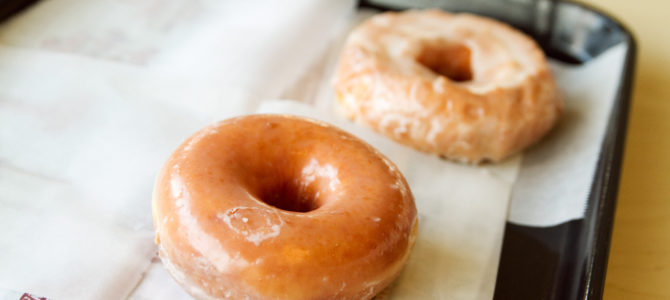
Krispy Kreme announced Monday the sweet-treat chain would be giving away free doughnuts to vaccinated individuals who can offer proof of vaccine immunization.
Starting this week, customers with a COVID vaccination card showing they have received at least one dose of the two-shot vaccines from Pfizer or Moderna, or one shot of the Johnson & Johnson vaccine may redeem a free Original Glazed doughnut.
“Krispy Kreme also will continue to encourage everyone to share joy and take care of each other by launching ‘Be Sweet Weekend,’ offering guests who purchase any dozen an additional ‘Be Sweet Dozen’ to safely share with a friend or neighbor for just $1,” the company wrote in a press release.
And it’s not a one-time giveaway. The offer lasts the rest of the year.
The promotion might be cute, and it’s certainly good marketing, but it’s deeply irresponsible.
Obesity is among America’s leading public health crises, more than COVID, more than heart disease, more than diabetes. All three are exacerbated by the nation’s unsustainable weight, growing under the lockdowns as Americans binge on carbs, alcohol, and Netflix to cope with the trauma inflicted by politicians and public health officials.
A new survey out this month from the American Psychological Association interviewing 3,000 U.S. adults found 61 percent, or six in ten Americans gained undesired weight since the start of the coronavirus pandemic. Of those Americans who put on unwanted weight, millennials put on the most, packing on an average 41 pounds. Millennials were already the most obese generation, growing up in an era of packaged and processed foods.
Holy cow: 42% of Americans report undesired weight gain during Covid 19. The average weight gain is 29 lbs. And 41 lbs for Millennials! This will ramify for years to come. https://t.co/iRnyMDxbmX pic.twitter.com/tR9tcnt4s7
— Jonathan Rauch (@jon_rauch) March 22, 2021
The severity of the coronavirus pandemic has already offered a tragic lesson on the consequences of widespread obesity. According to the latest data from the Centers for Disease Control (CDC), more than 70 percent of U.S. adults 20-years-old and older are overweight. More than 42 percent qualified as obese.
The pre-existing weight epidemic made the U.S. especially vulnerable to a viral pandemic with a disease of inflammation which targets the respiratory system. Obese and overweight individuals, whose bodies already suffer inflammation, stand at greater risk of serious complications from a virus that’s claimed nearly 550,000 lives in the United States within 12 months. Obesity is also a primary culprit of creating pre-existing conditions that leave individuals more susceptible to potentially-fatal COVID complications such as diabetes and certain cancers.
Some doctors say it’s not so far-fetched to claim the U.S. death toll would likely have been far lower had Americans lived at a normal weight.
Dr. Tim Logemann of the Wausau Aspirus Hospital Cardiologist and Obesity Treatment Program in Wisconsin told The Federalist young people in particular, “would see much less deaths” at a normal weight.
Those treating the coronavirus realized early on obesity played a role in patient outcomes.
“Since the pandemic began,” Science Magazine reported last fall, “dozens of studies have reported that many of the sickest COVID-19 patients have been people with obesity.” In one study published in August, overweight patients stricken with COVID-19 were 113 percent more likely to be hospitalized compared to patients of an otherwise healthy weight. Obese patients were found 74 percent more likely to end up in intensive care units (ICU) and 48 percent more likely to die.
Yet, even as the nation emerges from a pandemic teaching a painful lesson on obesity, few Americans see excessive weight gain as serious a problem. Lockdowns closed gyms across the country, even outdoor fitness events have been canceled, and a stressed population confined to their living rooms has turned to detrimental habits. Krispy Kreme’s promotion is a direct reflection of Americans who have appeared to have learned nothing.
One Krispy Kreme Original Glazed doughnut, according to the company’s posted nutritional label, includes 190 calories. Each includes 10 grams of sugar, nearly half the American Heart Association’s maximum daily recommended intake for women, and a third of the recommended intake for men.
The colorful trays behind the Krispy Kreme counter complemented by the aroma of fresh pastries flooding the entrance make it hard to resist the temptation to make an additional purchase. That’s why the company offers free so often. They get you in the store, then tempt you for more.
The obliviousness to obesity as a public health crisis stems in part from a cultural conversation that cloaks the weight issue in the moral righteousness of aggressive body positivity.
Pop-star icon Lizzo gets vilified by fans as glorifying “diet culture” whenever she posts about doing things for her health. In January, the women’s magazine Cosmopolitan unveiled its February issue with covers of visibly obese women glossing the front page with the words, “This is healthy!”
Obesity is the second leading cause of preventable death and raises individuals’ risk to complications from COVID-19.
I’m sorry, this is not healthy. @Cosmopolitan pic.twitter.com/U8R0THaiiz
— Tristan Justice (@JusticeTristan) January 4, 2021
It’s important not to body shame. Doing so only plays into activist claims that raising awareness of the issue is only ever done in bad-faith arrogance over a deeply emotional problem. But ignoring the issue, and pretending obesity isn’t the problem that it is, is deeply irresponsible, and will only leave an overweight population even more vulnerable to future pandemics to come while exacerbating public health crises that already exist.
Sure, vaccinated individuals need not worry about potential complications from the novel Wuhan coronavirus. A simple indulgence then, might be in order. But this offer lasts the entire year, and a culture of accepted prolonged weight gain will have long-lasting consequences.









